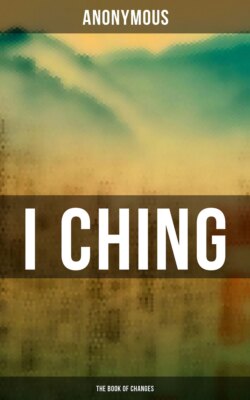Читать книгу I CHING (The Book of Changes) - Anonymous - Страница 19
На сайте Литреса книга снята с продажи.
ОглавлениеHexagram IV.4 Măng
Table of Contents
Măng (indicates that in the case which it presupposes) there will be progress and success. I do not (go and) seek the youthful and inexperienced, but he comes and seeks me. When he shows (the sincerity that marks) the first recourse to divination, I instruct him. If he apply a second and third time, that is troublesome; and I do not instruct the troublesome. There will be advantage in being firm and correct.
1. The first line, divided, (has respect to) the dispelling of ignorance. It will be advantageous to use punishment (for that purpose), and to remove the shackles (from the mind). But going on in that way (of punishment) will give occasion for regret.
2. The second line, undivided, (shows its subject) exercising forbearance with the ignorant, in which there will be good fortune; and admitting (even the goodness of women, which will also be fortunate. (He may be described also as) a son able to (sustain the burden of) his family.
3. The third line, divided, (seems to say) that one should not marry a woman whose emblem it might be, for that, when she sees a man of wealth, she will not keep her person from him, and in no wise will advantage come from her.
4. The fourth line, divided, (shows its subject as if) bound in chains of ignorance. There will be occasion for regret.
5. The fifth line, divided, shows its subject as a simple lad without experience. There will be good fortune.
6. In the topmost line, undivided, we see one smiting the ignorant (youth). But no advantage will come from doing him an injury. Advantage would come from warding off injury from him.
Footnotes
4. As Kun shows us plants struggling from beneath the surface, Măng suggests to us the small and. undeveloped appearance which they then present; and hence it came to be the symbol of youthful inexperience and ignorance. The object of the hexagram is to show how such a condition should be dealt with by the parent and ruler, whose authority and duty are represented by the second and sixth, the two undivided lines. All between the first and last sentences of the Thwan must be taken as an oracular response received by the party divining on the subject of enlightening the youthful ignorant. This accounts for its being more than usually enigmatical, and for its being partly rhythmical. See Appendix I, in loc.
The subject of the first line, weak, and at the bottom of the figure, is in the grossest ignorance. Let him be punished. If punishment avail to loosen the shackles and manacles from the mind, well; if not, and punishment be persevered with, the effect will be had.
On the subject of the second line, strong, and in the central place, devolves the task of enlightening the ignorant; and we have him discharging it with forbearance and humility. In proof of his generosity, it is said that 'he receives,' or learns from, even weak and ignorant women. He appears also as 'a son' taking the place of his father.
The third line is weak, and occupies an odd place belonging properly to an undivided line; nor is its place in the centre. All these things give the subject of it so bad a character.
The fourth line is far from both the second and sixth, and can get no help from its correlate,--the first line, weak as itself. What good can be done with or by the subject of it?
The fifth line is in the place of honour, and has for its correlate the strong line in the second place. Being weak in itself, it is taken as the symbol of a simple lad, willing to be taught.
The topmost line is strong, and in the highest place. It is natural, but unwise, in him to use violence in carrying on his educational measures. A better course is suggested to him.
